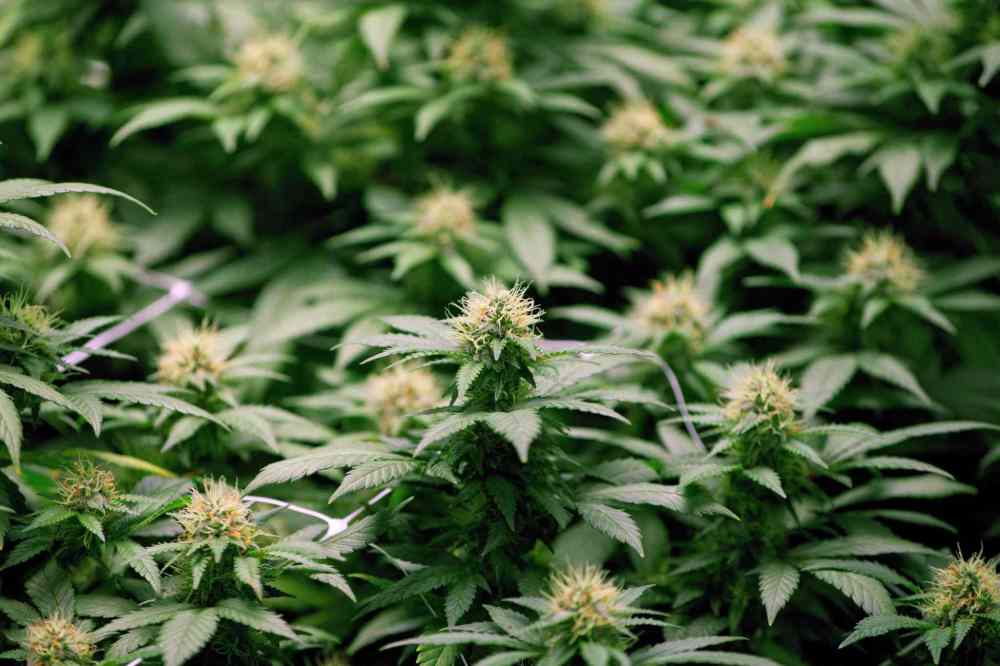Both sides now: Sell marijuana only in government liquor stores
Advertisement
Read this article for free:
or
Already have an account? Log in here »
To continue reading, please subscribe:
Monthly Digital Subscription
$0 for the first 4 weeks*
- Enjoy unlimited reading on winnipegfreepress.com
- Read the E-Edition, our digital replica newspaper
- Access News Break, our award-winning app
- Play interactive puzzles
*No charge for 4 weeks then price increases to the regular rate of $19.00 plus GST every four weeks. Offer available to new and qualified returning subscribers only. Cancel any time.
Monthly Digital Subscription
$4.75/week*
- Enjoy unlimited reading on winnipegfreepress.com
- Read the E-Edition, our digital replica newspaper
- Access News Break, our award-winning app
- Play interactive puzzles
*Billed as $19 plus GST every four weeks. Cancel any time.
To continue reading, please subscribe:
Add Free Press access to your Brandon Sun subscription for only an additional
$1 for the first 4 weeks*
*Your next subscription payment will increase by $1.00 and you will be charged $16.99 plus GST for four weeks. After four weeks, your payment will increase to $23.99 plus GST every four weeks.
Read unlimited articles for free today:
or
Already have an account? Log in here »
Hey there, time traveller!
This article was published 20/09/2017 (2993 days ago), so information in it may no longer be current.
The federal government is set on legalizing marijuana by summer 2018. While the Liberals will enjoy the political payoff of appearing progressive, all the problems and the logistics of legalizing pot will fall on the shoulders of the provincial governments.
- Read the other side of this debate below: Public monopoly wrong model for pot sales
There are strong correlations between how a drug or an indulgence, such as gambling, is made available to the public and the propensity for individuals to indulge in it, and the negative health and social outcomes associated with its use.
In other words, it matters how we legalize marijuana, not just that we legalize it.
Provincial governments might want to draw lessons from the last time an illegal substance — alcohol — was legalized, following Prohibition in the late 1920s, as well as insights from current public-health efforts to eliminate tobacco use.
For starters, it might make sense to make acquiring recreational marijuana reasonably expensive and somewhat difficult.
All provincial governments (except Alberta, which eliminated its liquor board) should consider selling recreational marijuana only in government liquor stores because they have the secure infrastructure to deal with a drug with narcotic properties. They also have well-trained staff and secure logistical facilities to ensure it’s distributed in a socially responsible manner. This will eliminate the potentially enormous political problem of licensing and determining where (and when) dispensaries will be permitted. It will also prevent organized criminal elements from operating dispensaries.
Most critically, governments should control the retail end of marijuana and the wholesale side. They should sell recreational marijuana as a store brand in plain packaging and offer only a few types. This will prevent manufacturers from developing and promoting brands of pot through advertising.
Store brands are more profitable for retailers largely because they gain more control over manufacturing and cut out supplier middlemen. As the sole wholesaler in a province, liquor boards will be able to drive hard bargains with manufacturers.
There must also be significant taxes imposed on marijuana. But taxes will not earn significant revenues, as the government must also cover the costs associated with its (mis)use.
Government revenues from the sale of pot will already be restricted given the decline in pot prices over the past 25 years: on the illegal market, a gram of pot in the 1990s cost $15, while today it costs less than $10.
Contrary to popular belief, the legalization of marijuana will require an increase in police and legal efforts to stamp out the black market. When government liquor commissions took over alcohol distribution, bootleggers had to be eliminated or they would undercut the state’s monopoly on sales, and its ability to control how it was sold and consumed.
Policies will also need to be developed to allow police to determine which pot has been legally procured and which has not. Since federal legislation will permit Canadians to grow marijuana at home, verifying legally procured marijuana will be considerably more difficult.
Provinces should also be wary about offering edible pot. Ingesting marijuana substantially increases its potency and it’s often sold in child-attractive products such as brownies, gummy bears and the like, substantially increasing the potential for accidental consumption — including by children. If provinces decide to sell edibles, they should ensure that dosage amounts per item are consistent between products and are presented in a way that’s easy for consumers to understand.
The provinces will also need to establish a permit-and-purchase tracking system. If individual sales can be tracked to original purchases, and purchasers, this would aid in preventing marijuana from ending up in the hands of minors. Persistent violators who resell marijuana could have their permits revoked.
Governments should consider restricting the purchase age to 21, as recommended by many medical practitioners.
And in order to limit consumption and normalization of its use, there should be no advertising or promotion of marijuana.
Provincial governments must make the best of a very difficult situation. Consumption of marijuana will likely rise, as will the costs of dealing with its effects.
Like many issues in Canadian federalism, this is a classic case of the federal government being wholly detached from the reality of implementing policy and the real costs associated with it.
Malcolm Bird teaches political science at the University of Winnipeg and is an expert adviser with EvidenceNetwork.ca.

Public monopoly wrong model for pot sales
As recreational cannabis becomes legal nationally on July 1, Canadians are faced with tremendous opportunity and risk. Our country is essentially rolling back a long-existing illegal trade to facilitate a legal, regulated market. The purpose, as the federal Liberal platform says, is: “to ensure that we keep marijuana out of the hands of children, and the profits out of the hands of criminals, we will legalize, regulate and restrict access to marijuana.”
With much yet to be figured out, the following focuses on the issue of how to implement retail distribution, which rests with each province.
The primary question we are addressing here is whether to create a government monopoly. Many have the impression that the only alternative is a Wild West model of mom-and-pop shops multiplying unrestrainedly, without regard for safety or risk and harm reduction. This black or white comparison is oversimplified.
It is a balanced approach that will resolve the issues we face and that monopolies simply cannot fix. Monopolies may actually contribute additional issues such as higher prices, leaving the door open to increased competition from cheaper illegal suppliers, online and elsewhere.
Rarely, if ever, do monopolies facilitate normal market forces in solving important problems such as providing least-cost access to product, without unnecessary delays and to a wide geographic range of people. Economic opportunities to multiple participants in the cannabis business are lost. Moreover, a government monopoly diminishes the opportunity for Indigenous economic participation and benefit.
There is, however, a crucial role for government to play in creating a comprehensive regulatory and legislative framework that it can enforce with rigorous safety-related testing infrastructure. Competitors who can meet these demands and requirements may then be screened for participation.
As Manitobans know well, the province is founded on successful business, from early Indigenous trading prior to European arrival to subsequent innovators such as Ashdown Hardware and onwards to modern national and global leaders like Great-West Life, the Richardsons, Nygård and, most recently, an exciting group of Machine Learning companies. As it has always been, private-industry involvement is a key to finding solutions to many of the questions a monopoly simply can’t address.
We believe that the best way to continue to advance the social, justice and security concerns of Manitobans in time for recreational cannabis becoming legal is through the development of an innovative and competitive private-sector model. In our case, we are willing to risk tens of millions of dollars in investment. Although we are the leader in our field now, we would not be the only company that would eventually qualify.
Profoundly relevant to this debate is that there is already a 30-year-mature cannabis business. The federally appointed Task Force on Marijuana Legalization and Regulation commented that “the illegal trade of marijuana reaps an estimated $7 billion in income annually for organized crime.”
In the medicinal cannabis world we know there are many blends and combinations of cannabinoids with varying chemical attributes that affect people differently. The current recreational black market has millions of customers with established buying patterns and sophisticated tastes based on buyer choice and low pricing.
What would make these millions of consumers switch from current buying patterns without product variety, affordability or availability? As one paper said of Ottawa’s position, “inadequate supply of marijuana from authorized vendors could play into the hands of illegal dealers, creating a gaping hole in legal sales.” None of this achieves any of the government’s goals for legalization.
The police can’t magically erase the black market. After three decades of the failed war on drugs, it’s time to show new leadership.
Many legal companies — such as ours — have been acting within the law and in good faith for years under the Access to Cannabis for Medical Purposes Regulations. These private companies have diligently serviced legitimate medical needs legally.
We are a longtime leader of a doctor-led clinical model for medical treatment with 10 locations nationally, including in Winnipeg. As a national, publicly traded company, our ownership disclosure eliminates room for organized crime.
If you look at the history of government-controlled liquor distribution and how rampant youth consumption has always been, you’re compelled to naturally dismiss the absurd pretense that government monopoly equals absolute safety.
As already discussed above, the government monopoly model may, in fact, play right into the hands of organized crime.
If we are to achieve the stated objectives for legalization, what really provides the solution at retail is a balanced approach. For this reason, we advocate strong government regulations and legislation and a private-market model that allows experienced, safe, well-governed, -financed and -disclosed companies to compete for consumer demand in the recreational cannabis market.
Mark Goliger is chief executive officer of National Access Cannabis.
History
Updated on Wednesday, September 20, 2017 2:17 PM CDT: Adds link to second part of debate.


